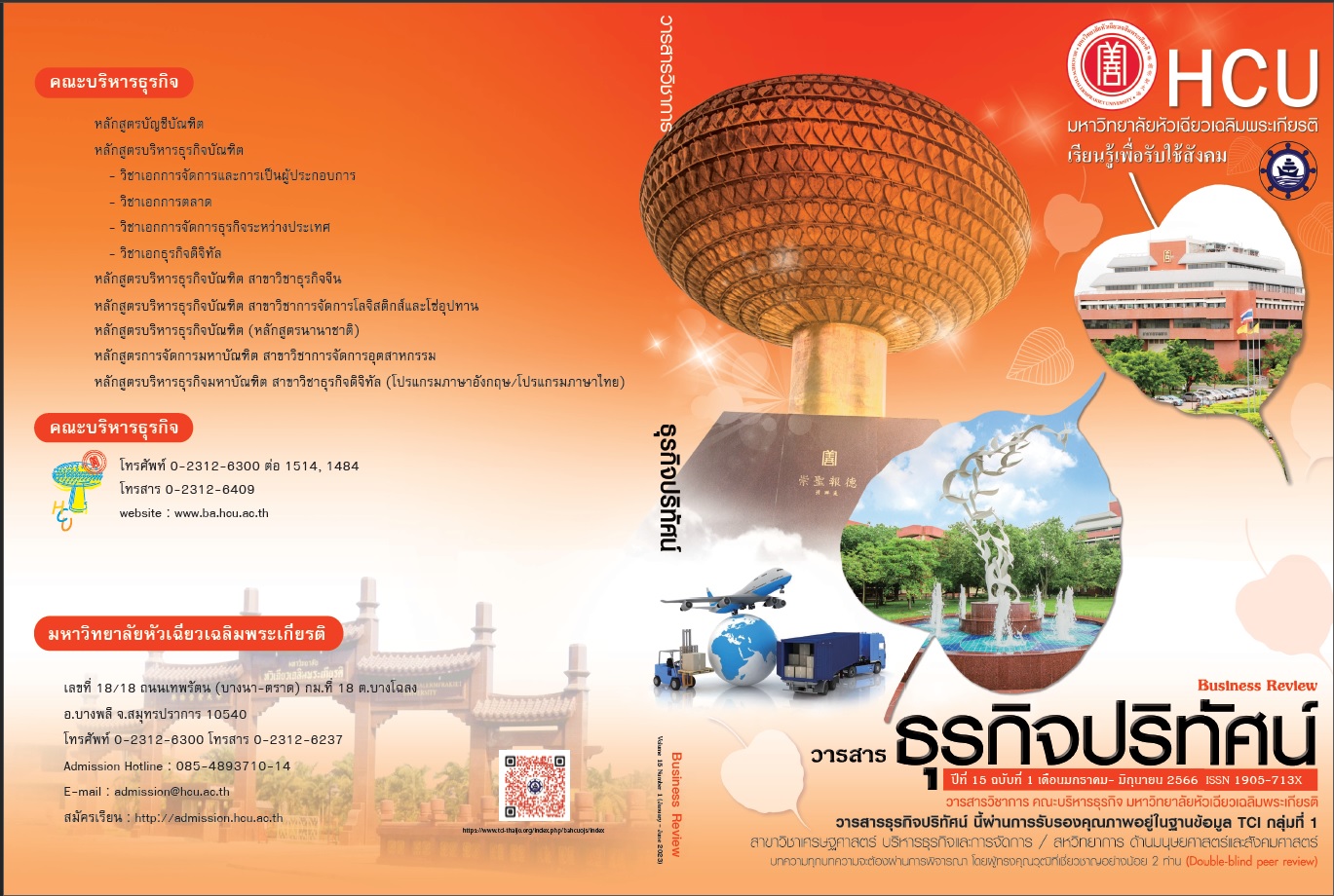Determinants of Supply Related to Negative Word of Mouth in Hotel Industry
Keywords:
Thai accommodation, dissatisfaction, supply, online commentsAbstract
This paper aims to investigate the correlation between the supply-side factors (star rating, location, size, management system, and pricing rate) and negative word of mouth towards the Thai tourism industry on Online Travel Agents (OTAs). This paper is conducted through mixed method. For the qualitative research, the data collection was obtained from the Online Travel Agent’s website based on 3 criteria which were website selecting criteria, accommodation selecting criteria, and negative comments selecting criteria. As a result, 3,713 qualified negative comments were categorized accordingly to the marketing mix of service components (product, price, place, promotion, process, people, and physical evidence in the public areas). For the quantitative research, the results were testing via Chi-Square and coefficient Cramer’s V. The result represented that star rating, location, size, and price rate correlated to negative word of mouth as 0.05 statistically significant. Moreover, star rating, location, size, and price rate correlated to negative word of mouth as low and lower effect size.
References
กฤษณะ ดาราเรือง, สิทธิพร เขาอุ่น และเชาฤทธิ์ จงเกษกรณ์ . (2561). การรับรู้คุณภาพการให้บริการและส่วนประสมการตลาดที่ส่งผลต่อความภักดีของผู้ใช้บริการโรงแรมในอำเภอเมืองนครสวรรค์ จังหวัดนครสวรรค์. วารสารวิทยาลัยดุสิตธานี, 2(ฉบับพิเศษ), 57-70.
ชัยณรงค์ พิพิธวีรนันท์. (2559). ปัจจัยส่วนผสมทางการตลาดและพฤติกรรมของนักท่องเที่ยวชาวไทยที่เลือกใช้บริการที่พักประเภทโฮสเทล ในเขตจังหวัดประจวบคีรีขันธ์. วิทยานิพนธ์บริหารธุรกิจมหาบัณฑิต, มหาวิทยาลัยนานาชาติแสตมฟอร์ด.
เตือนใจ ศรีชะฏา. (2560). ปัจจัยที่ส่งผลต่อการตัดสินใจเลือกที่พักแรมของนักท่องเที่ยวชาวไทยในเขตพื้นที่เมืองพัทยา. วารสารวิจัยและพัฒนา วไลยอลงกรณ์ ในพระบรมราชูปถัมภ์ สาขามนุษยศาสตร์และสังคมศาสตร์, 12(1), 247-259.
Ali, R. (2014). The most popular online booking sites in travel, 2014 edition. Retrieved April 26, 2017, website: https://skift.com/2014/06/17/the-most-popular-online-booking-sites-in-travel-2014-edition/
Ariffin, A., & Maghzi, A. (2012). A preliminary study on customer expectations of hotel hospitality: Influences of personal and hotel factors. International Journal of Hospitality, 30(1), 191-198.
Ascaniis S.D., Borrè A., Marchiori E., & Cantoni L. (2015) listen to your customers! How hotels manage online travel reviews. The case of hotels in lugano. In: tussyadiah i., inversini a. (eds), Information and Communication Technologies in Tourism 2015., Switzerland : Springer.
Bona, K., Seongseop, K., & Heo, C. Y. (2019). Consequences of customer dissatisfaction in upscale and budget hotels: focusing on dissatisfied customers’ attitude toward a hotel. International Journal of Hospitality & Tourism Administration, 20(1), 15-46.
Cakim, I. M. (2010). Implementing Word of Mouth marketing: online strategies to identify influncers, craft stories, and draw customers. New Yersey: John Wiley & Sons.
Dolnicar, S. (2007). Business travellers’ hotel expectations and disappointments: A different perspective to hotel attribute importance investigation. Asia Pacific Journal of Tourism Research, 7(1), 29-35.
Euromonitor International. (2017). Top 100 city destinations ranking: wtm london 2017 edition. London: Euromonitor International.
Frye, W. D., & Mount, D. J. (2007). An examination of job satisfaction of general managers based on hotel size and service type. Journal of Human Resources in Hospitality & Tourism, 6(2), 109-134.
Jeong, M., & Jeon, M. M. (2008). Customer reviews of hotel experiences through consumer generated media (cgm). Journal of Hospitality & Leisure Marketing, 17(1), 121-138.
Katay, A. (2015). The causes and behavior-altering effects of hotel guests’ dissatisfaction. Journal of Tourism & Services, 6(11), 28.
Knutson, B. (1988). Frequent travelers: making them happy and bringing them back. The Cornell Hotel and Restaurant Administration Quarterly, 29(1), 82-87.
Lee, J., Park, D.H., & Han, I. (2008). The effect of negative online consumer reviews on product attitude: An information processing view. Electronic Commerce Research and Applications, 7(3), 341-352.
Lee, S. K., & Jang, S. S. (2011). Room rates of u.s. Airport hotels : examining the dual effects of proximities. Journal of travel Research, 50(2), 186-197.
Litvin, S. W., Goldsmith, R. E., & Pan, B. (2008). Electronic word-of-mouth in hospitality and tourism management. Tourism management, 29(3), 458-468.
Mariussen, A., Brookes, M., Bowie, D., & Buttle, F. (2016). Hospitality marketing. London: Taylor & Francis Ltd.
Middleton, V., & Clarke, J. (2001). Marketing in travel and tourism. Boston: Butterworth-Heinemann.
Ottenbacher, M., Shaw, V., & Lockwood, A. (2006). An investigation of the factors affecting innovation performance in chain and independent hotels. Journal of Quality Assurance in Hospitality & Tourism, 3(4), 113-128.
Porter, W. L., & Lawyer, E. E. (1965). Properties of organization structure in relation to job attitudes and job behavior. Psychological Bulletin, 64(1), 23-51.
Ruekert, R., Walker, O.J., & Roering, K. (1985). The organization of marketing activities: a contingency theory of structure and performance. Journal of Marketing, 49(1), 13-25.
Sparks, B. A., & Browning, V. (2011). The impact of online reviews on hotel booking intentions and perception of trust. Tourism Management, 32(6), 1310-1323.
Va´squez, C. (2011). Complaints online: the case of tripadvisor. Journal of Pragmatics, 43(6), 1707-1717.
Yang, Y., Mao, Z., & Jingyin, T. (2017). Understanding guest satisfaction with urban hotel location. Journal of Travel Research, 57(2), 243-259.
Downloads
Published
How to Cite
Issue
Section
License
Copyright (c) 2023 Business Review Journal

This work is licensed under a Creative Commons Attribution-NonCommercial-NoDerivatives 4.0 International License.
All articles published in the Business Administration and Management Journal Review are copyrighted by the journal.
The views and opinions expressed in each article are solely those of the individual authors and do not represent those of Huachiew Chalermprakiet University or any other faculty members. Each author is fully responsible for the content of their own article. Any errors or issues found are the sole responsibility of the respective author.




